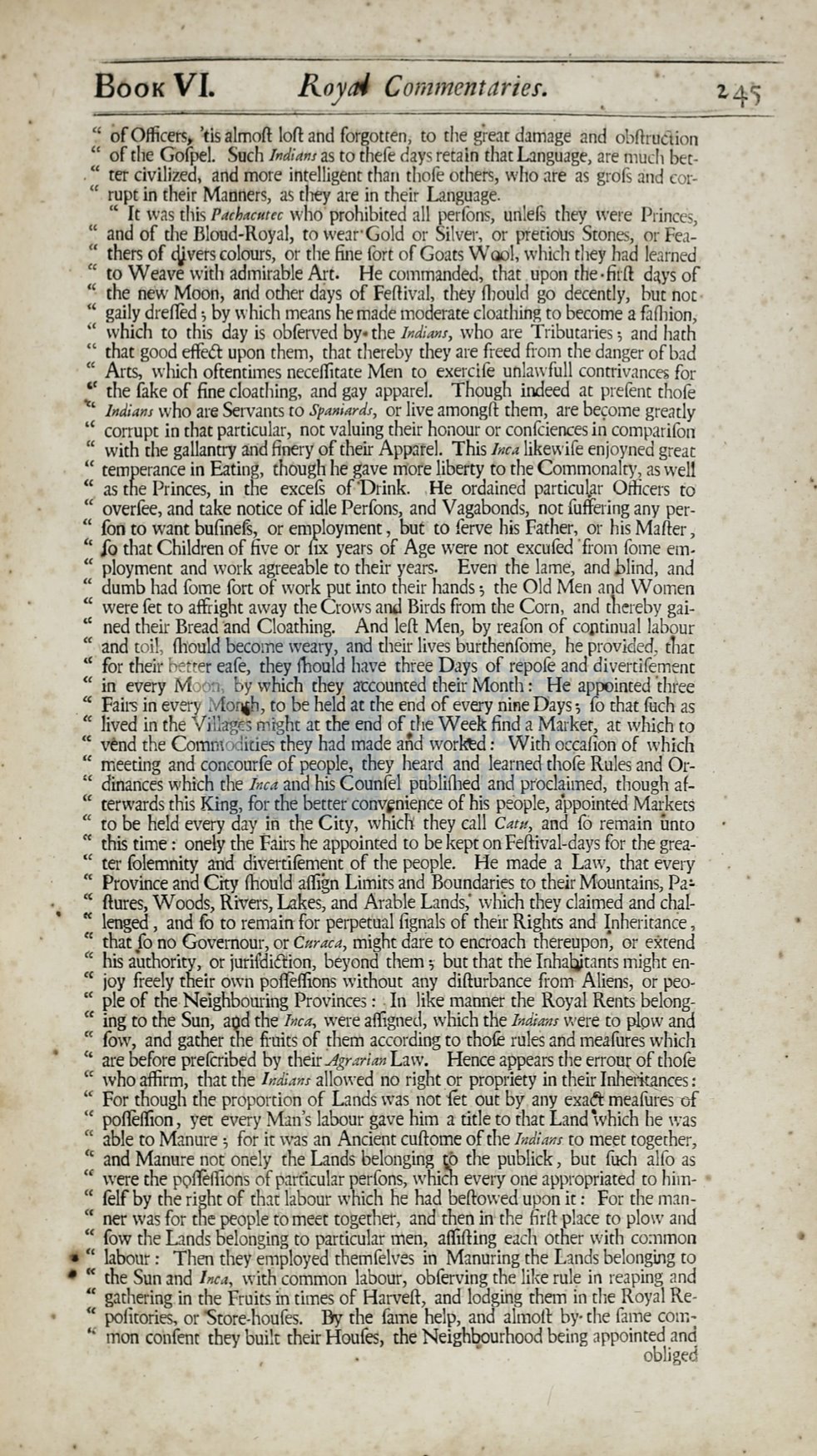

BooK
VI.
Royal
Commentaries.
" ofOfficets,
!tis
almoíl: !oíl: and forgotren, to the gi-ear damage and obfüuéiion
" of che Go[pel. Such
Indian1
as
to
thefe days retain that Lrnguage, are much bet–
." ter civillzed, arld more in~elligent than chofe others, who are as grofs ánd cor–
" rupt
in
rheir Maarters, as rhéy are in rheir Language.
" It was rhis
Pachacutec
who'prohibired ali perfons, unlefs rhey were Princes,
" and of rhe Bloud-Royal, to wear·Gold or Si\ver, or ptetio'us Srones, or Fea–
" thers of cV-vets rnlours, or the fine fort of Goats W
oo'I,
which they haéf learned
" to Weave with admirable
Art.
He cornmanded, that .
u
pon the ·
firíl:
dqys of
" the
new
Mdbll, artd other dáys of Fefüval, they fhould g-0 decently, but
noc
" gaily dreffed ; by which means he made moderate cloathihg
to
become a fafbion,
" which to chis day is obferved by•the
Indian1,
who are Tributaries; and hath
" that good effeél: upan rhem, thac chereby they are freed frorn che danger ofbad
" Ares, which oftemimes neceflitate Men to exercife unlawfull contrivances far
'' the fake of fine cloaching, and gay apparel. Th?ugh indeed ac prefenc chofe
.,,
lndian1
who are Servants
to
Spaniard1,
or live amongíl: them, are be~ome greatly
'' corrupt in chac particular, noc valuing their honour or confciences in comparifon
" with che gallantry
árid
finery'
9[
their Appa1fel. This
Inca
likewi[e enjoyned great
" cemperance
in
Eating, though he gave m'ore liberty to che Commonalty,
as
weli
". as the Princes, in the excefs of'Drink. ,He ordained particular Officers
to·
ce
overfee, and cake notice of idle Perfons, and Vagabonds, nor fuffering any per–
" fon to want buíinefs, or employmem ,· bue to ferve his Father, or his Mafl:er ,
''
fo
that Children of five or
fü:
years of Age were not excufed ·from fome em–
" ployment and work agreeable ro their years. Even the lame, and blind, and
" dumb had fome fort of work put into their hands ; the Old Men and
W
ornen
" were fec ro affright away the Crows and Birds from the Corn, and chereby gai–
" ned their Bread and Cloathing. And leíl: Men, by reafon of coptinual labour
ce
\and
coi!,
íh'ould becorne weary, and their lives bm'thenfome, he provlcled,
tlm
,,· for their better eafe, they fhould have rhi?ee Days of re'pofe and divertríemenc
" in every Moón,
by
which chey átcounted their Momh: He appoiflted 'rhi'ee
." Fairs in tsvery
MoQ¡h,
to be held ar the end of every nine Days;
fo
1:hat
füch
as
" 1ived in che Vi.llag€s
mrgfit
at the end of che Week find a Marker, at w]lich ro
«
vend the Comntódities they had made
aM
workt:d: Wich 0q:a11on of w)üch
" meeting and conrnurfe of people, rhey heard and leamed rhofe
Ru
1
les'. and Or–
" dit'lances
~,hkh
che
inca
and his Counfe'!i pqblifhed and prodairned, though
a(
-
'' terwardschis ~ing, for tf1e becter' conv;nie'.née of his pe'ople, a'ppoimedMarkecs
" to
be
field
every day
_il'i
rhe City, whicl\'. they call
Catu,
and
fo
remain Únco
" this time·:· onely ~he Fairs
he
appoin~ed
to
be kept qnFeft:ival~days for the grea-·
" ter folemnity'
a'n'd
diverrífement of the people. He made a Law, that every
" Province and Crty ffíould1 il,flig'n _Lirnits and Boundari~s
to
their Mouncairis, Pa~
" íl:ures, Woods, RiVe1
1
s, Likes, and Arable Lands,' which they claimed ·and cha!–
«
lenged, and
fo
to remai'n for ¡i)erpet'ual' íigna1s of cheir Rights and Inhericanée ,
" that
fo
no Goverrtour, or
C:'uraca,
m'ight dare
to
encroach thereúp0n: or extend
<,
his auchority, or juriMiaion, béyond' them, bue that ene Inhaijtants mighc en–
" joy freely their ówh poffeflions without any diíl:urbance from Al'iens, or peo–
" ple of rhe-Neighbo'uríhg Provinces : .In like ma'nner che Roya-1 Refl'ts belong–
" ing·to the Sun, ao& the'
Inca,
were affigned, wnicb tHe
Indians
v,1ere to plow and
" fow, and gather rhe
frmts
of thern according to chofe rulesand meafutes which
'' are befare preff:ribe'd
by
their
Agrarían
Law. Hence appears the errou¡:_of chofe
'' who affirm, that tfie
Indian.r
allowed
no
right _or propriety in their Inhe1itances:
" for though the proportion of Landswas not
fet
Out
oy
any exaét! nieafüres-cf
" poffeffion,
yer
every Man's labour gave him a title to thac Land \Vhich
be
was
" able to Manure ; for Ít was an Ancient cuíl:9me ofthe
India111.
to meec togerher,
'' and Manure not' onely the Lands belonging
to
the publitk , bue fuch alfo as
'f
were the pofilffiotts of particular perfo11.s, whkh every one aµpropriated to him- .
"
[elf
by che right of
tlut
lkbour which he had beíl'owed upon ic : For che man–
" ner was for che people romeet together, and then in
1
che
firíl:
place ro plow and
" fow
rhe Lands belonging to particular nien, aillíl:ing each ocher with co~nmon
• " labour : Then rheye111ployed chemfelves in Manuring che E.ands belonging to
• e<
the Sun and
Inca,
wich common labour, obferviog rhe like rule in reaping and
" gachering
ih
che Fruits
fu
times of Harveíl:, and lodgihg rhem
Ín
che Royal Re–
" pofüories, or 'Store-houfes.
By
the fame help, and almo{l by· che fame co1r.·
" mon cohfenr they builc cheir Houfes, che Neighbourhood being appointed and
obLlged














